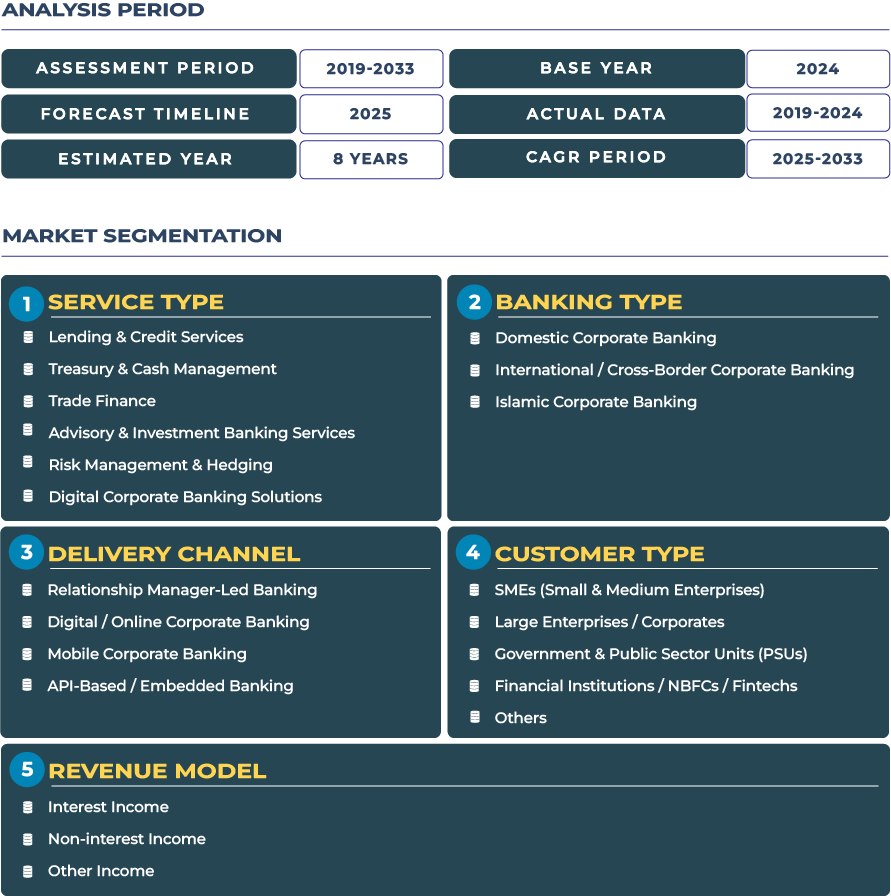Corporate Treasury and Cash Solutions in Brazil: Enhancing Liquidity for Large and Mid-Sized Enterprises
Brazil corporate banking industry is undergoing a strategic transformation centered on optimizing liquidity and improving cash management systems for enterprises. With rising corporate complexity, fluctuating commodity prices, and currency volatility, corporate banks in Brazil are increasingly leveraging technology and data-driven treasury solutions. The market, valued at USD 49.8 billion in 2025 and projected to reach USD 56.3 billion by 2033 at a CAGR of 1.5%, is supported by growing demand for digital treasury tools, corporate lending, and trade finance. This growth aligns with Brazil’s renewed emphasis on industrial efficiency, fintech partnerships, and export financing capabilities. Banks are aligning with digital transformation agendas driven by the Central Bank of Brazil and corporate sustainability trends to enhance capital accessibility, transparency, and compliance.
Note:* The market size refers to the total revenue generated by banks through interest income, non-interest income, and other ancillary sources.
Brazil Corporate Banking Market Outlook: Digitally Empowered Treasury Management and Cash Flow Optimization Driving Brazil’s Corporate Banking Evolution
The Brazil corporate banking market is evolving from traditional credit-oriented offerings toward integrated treasury, cash, and liquidity solutions tailored for enterprises across diverse sectors. Corporate banks are adopting advanced ERP-integrated cash flow systems and real-time liquidity dashboards to help firms manage receivables, automate settlements, and mitigate foreign exchange risks. The focus is shifting toward digital treasury ecosystems where APIs connect clients’ ERP systems to bank platforms, ensuring seamless visibility into cash positions.
Brazil’s leading banks are accelerating partnerships with fintechs to innovate payment processing, trade finance, and treasury optimization tools for medium and large enterprises. The Ministry of Finance continues to support economic digitization policies, creating an enabling environment for the corporate banking sector. Despite moderate growth rates, steady adoption of advanced liquidity management, working capital automation, and ESG-aligned corporate finance products is driving steady progression in the country’s banking landscape.
Drivers & Restraints: Understanding the Core Forces Shaping Brazil Corporate Banking Landscape
Strong Corporate Financing Needs and Agribusiness Demand Fuel Market Expansion
Brazil corporate banking market is expanding on the back of large-scale industrial, infrastructure, and agribusiness financing. With agriculture representing nearly 25% of GDP, banks are offering advanced trade finance and receivables solutions to agribusiness exporters. Demand for working capital and pre-export financing remains high, driven by global commodity cycles and international trade expansion. Furthermore, as corporates adopt ERP and digital payment systems, treasury integration and real-time liquidity management are becoming essential to maintain competitiveness and operational efficiency.
Economic and Policy Volatility Pose Structural Constraints to Sustainable Growth
Despite opportunities, the Brazilian corporate banking sector faces challenges related to high interest rates, inflationary pressures, and complex regulatory frameworks. Frequent policy adjustments and tax code intricacies add friction to corporate transactions. Political uncertainty periodically impacts credit appetite, leading to cautious lending approaches by financial institutions. Furthermore, the labor-intensive nature of compliance and anti-money laundering obligations increases operational costs for corporate banks. These macroeconomic and regulatory challenges continue to test the resilience and adaptability of the country’s banking ecosystem, demanding innovation-led efficiency and cost optimization measures.
Trends & Opportunities: Digital Treasury, Green Finance, and Receivables Discounting Transforming Corporate Banking in Brazil
Corporate Digital Treasury Adoption Accelerates Amid Fintech Partnerships
A defining trend within Brazil corporate banking market is the adoption of digital treasury solutions, propelled by the rise of open banking and fintech integration. Financial institutions are now providing corporates with AI-driven cash management systems that forecast liquidity positions and automate fund transfers. This shift aligns with the broader digital payments revolution initiated by the Central Bank of Brazil’s PIX system, which has encouraged real-time payments and cash flow transparency across the corporate sector.
Green Finance and ESG Lending Empower Agribusiness Transformation
Green and sustainability-linked finance are gaining momentum in Brazil’s corporate banking ecosystem. Major lenders are channeling credit toward renewable energy, sustainable agriculture, and low-carbon infrastructure projects. Corporate banks are introducing ESG-linked loan products that offer preferential rates to companies demonstrating strong environmental and governance credentials. Agribusiness exporters, in particular, are leveraging these financial instruments to secure international capital under favorable conditions, aligning Brazil’s export financing with global sustainability standards.
Receivables Discounting and Pre-Export Financing Create New Capital Pathways
Receivables discounting platforms are transforming liquidity management for exporters and large corporates. By providing instant cash flow access through digital factoring, banks are enabling corporates to reduce dependency on traditional credit. Pre-export financing solutions are also expanding, supporting seasonal industries like agriculture and mining. These innovations are helping enterprises align financial cycles with operational cash flow needs, improving both liquidity efficiency and profitability. Collectively, these solutions demonstrate the growing sophistication of Brazil’s corporate banking infrastructure.
Competitive Landscape: Strategic Partnerships, ESG Financing, and Digital Treasury as Competitive Differentiators
Brazil competitive corporate banking sector features both domestic and international players such as Itaú Unibanco, Banco do Brasil, Bradesco, Santander Brasil, and BTG Pactual. These institutions are investing heavily in fintech collaborations and platform-based treasury management systems to serve mid-sized and large corporates.
For example, Itaú Unibanco and Bradesco have been expanding their corporate digital platforms that integrate cross-border payment solutions with supply-chain financing. Banco do Brasil has introduced new pre-export financing tools aligned with government-backed sustainability programs. Moreover, leading banks are focusing on ESG-linked agribusiness financing and blockchain-enabled trade finance platforms to improve transparency and risk assessment. These strategies are not only strengthening client relationships but also positioning Brazilian banks as leaders in corporate liquidity innovation across Latin America.







